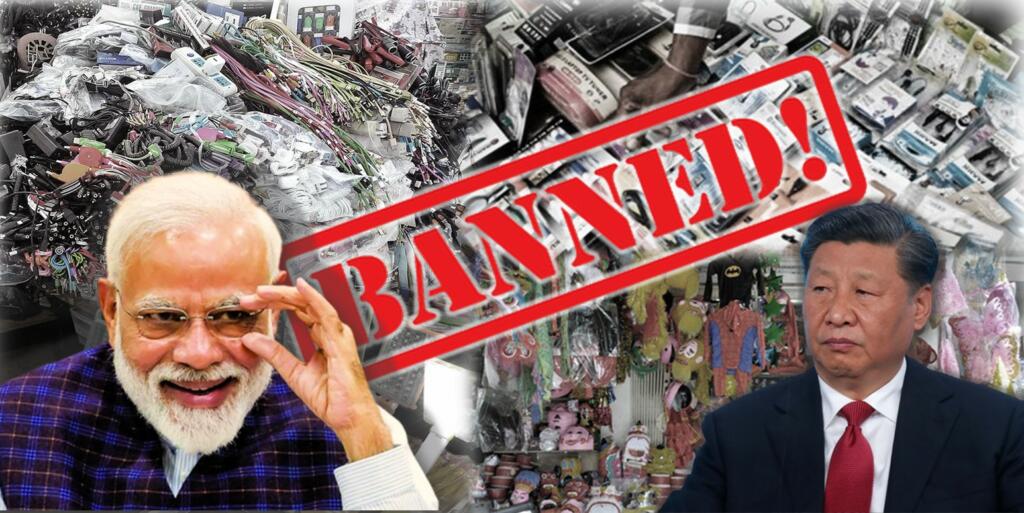Chinese imports: The Chinese stand in opposition to whatever they preach when it comes to geopolitical trade. Despite that, the low cost of production makes China the favourite destination for the manufacture of goods. China is perhaps the biggest exporter of manufactured goods in the world. On the contrary, the nation has an accolade for exporting substandard products in the global market.
Conversely, the PM Modi led central government has decided to curb the Chinese imports of substandard electronic products and toys into the Indian markets.
The Ministry of Commerce and Industry, under Piyush Goyal, is gearing up to soon issue quality control orders (QCOs) to check imports of electric fans and smart meters, especially from China. The move of the government comes as a follow up to the previous order to rein toy imports from China through stringent quality checks.
The policy concerning QCOs for mass production items such as smart meters and ceiling fans will help amplify the Make in India vision of India. Further, it will protect Indian consumers from using substandard products, as a result of which the consumers will get value for their money. In addition, it will enhance the product life of the consumer and electronic goods. Thereby, the waste production due to the circulation of Chinese goods would fall as well.
Modi-plan to annihilate Chinese export hegemony
China dominates the business of electronic products. Evidently, in FY22, the import of Chinese ceiling fans in India jumped by 132 per cent to an estimated $6.22 million. Out of which, the imports from China stood worth $5.99 million. Precisely, the import of electricity smart meters was worth $3.1 million, out of which $1.32 million came from China in FY22. Therefore, with the growing hostility of China towards its most tolerant neighbour, India, the latter is left with no other option to retaliate.
The Modi government’s policy to reduce the nation’s dependence on Chinese imports has great significance to India, as it will help boost the manufacturing sector in India. The Indian manufacturers have been at the receiving end owing to the low cost of production in China. Many of the small-scale manufacturers in India have succumbed in the past, therefore, the policy change is seen as a significant step to further the interests of the Indian growth story.
Also read: Rs 75,000 Crores: China’s loss during Diwali
The success story of the toy ban
The vitality of Chinese economic progress lies in the magnanimous supply chain network of the nation. However, following the border clashes with India, the government of India imposed serious sanctions on the import of toys from China.
Following the quality control order of 2020, Chinese toy imports dropped 70 per cent in the last three years, from $371 million in FY19 to $110 million in FY22. More importantly, the imports of toys from China dropped by 80 percent of $59 million in the same period. The policy was also in view of the widening trade deficit with China, prompting India to take measures to curb non-essential imports from China.
However, the policy of the Indian government to limit the toy imports from China was a stepping stone towards bringing down the trade deficit. More significantly, it was just the beginning of sanctions on China, keeping in view the hostile approach of China towards India. The growing market of Chinese exports to India, has forced the government to come up with an effective quality check mechanism.
Ever since the pandemic, the government imposed quality controls to curb non-essential imports and provide capacity building incentives to the domestic industry. During this period from 2020, the industry department has notified about 20 QCOs in contrast to about 18 to 19 QCOs in the previous two decades – between 2000 and 2019.
Also read: Chinese toys outta Indian market: Make in India alters the rules of the game
Curb on Chinese electronics: Modi has hit the nail on the head
Prime Minister Narendra Modi has not only been unequivocally supporting the Atma Nirbhar Bharat and Make in India initiatives but also has worked wonders in creating a better ecosystem for business. The initiatives however, faced serious threats from Chinese substandard goods, as the cheap Chinese products were more affordable. But the government has put forth its vision of ensuring better quality products to its citizens.
To echo the lexis of Mr. Piyush Goyal, the trade minister, even the poorest citizen of the country deserves the best quality products and the culture of no compromise with quality has to be adopted. This vision of the minister is in consonance with the threshold requirement of getting licenses under the Foreign Manufacturers Certification Scheme (FMCS).
That is to say, the policy will help Indian consumers get better quality consumer durable goods and would help the nation take on the economic hegemony of the dragon. The malicious copyright of the Chinese business policy therefore, is surely going to face severe setbacks from the Indian counterparts in the years to come.
Support TFI:
Support us to strengthen the ‘Right’ ideology of cultural nationalism by purchasing the best quality garments from TFI-STORE.COM
